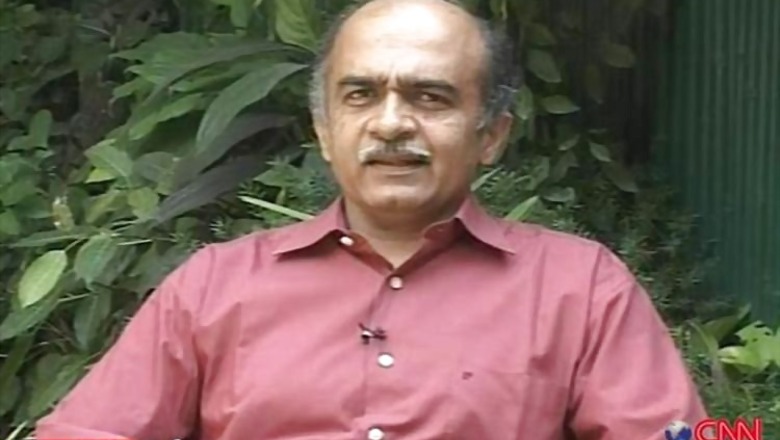
views
New Delhi: The functioning of the Centre for Public Interest Litigation (CPIL) on Tuesday came under severe scrutiny by the Supreme Court, which asked a series of searching questions to its counsel Prashant Bhushan by voicing concern that rival commercial litigants could be using the NGO as an instrument to settle scores.
The apex court noted that 50 PILs have been filed by the CPIL over the years, but it was of the impression that the NGO did not have any credible mechanism to verify the information which formed the basis for filing the PILs.
"We understand that our impression today is that you have no mechanism to scrutinise or verify the informations as to prima facie these informations disclose any fraud," a bench headed by Chief Justice TS Thakur said during the hearing of a PIL filed by CPIL challenging the grant of 4G licences to Mukesh Ambani's Reliance Jio Infocomm Ltd (RJIL).
"Your organisation should not become an instrument in the hands of commercial rivals of others and it should not appear that both of you work hand-in-gloves," the bench, also comprising Justices AK Sikri and R Banumathi, observed while emphasising that there should be a credible mechanism to scrutinise the information before filing PILs.
"When we entertain your petition, you must establish a credible mechanism of scrutiny. People of eminence should apply mind and certify that such a mechanism inspires confidence. We want to make sure that a petition filed by CPIL has gone through a particular process and is genuine," the bench said.
Bhushan replied in negative that the NGO filed PILs in return for a consideration and said there was an executive committee of senior advocates like Anil Divan, Shanti Bhushan, Colin Gonsalves and others who decide on the filing of PILs.
The bench said it was of the view that if there was a genuine mechanism to scrutinise information, there would be no problem if the NGO gets financial support for its functioning.
When Bhushan said that CPIL has a research wing to look into the information and materials, the bench said there should be an investigating wing that can give a report so that credible attempt can be made.
"Petitions should not be on the basis of the raw information," the bench added. Bhushan made an attempt to make it clear that it was aware of all the questions that was arising in the minds of the bench and said, "we do not have any personal interest."
He also said the PIL against the company was filed on the basis of the draft CAG report which had spoken about certain irregularities in the grant of 4G licence.
The bench asked why does not the NGO, instead of filing PILs, itself ask a particular individual or organisation to make their own efforts by approaching the court. "Why don't you advise if they have any material and information, instead of you filing the PIL, they themselves can file the writ petitions," the bench asked.
Bhushan said there have been cases where whistleblowers themselves do not want to come forward and prefer NGOs to take up their cause as happened in the leaked e-mail case of Essar pointing towards the corporate-political-bureaucrat nexus. The whistleblower was within the company, he said.
While he was replying, the bench asked: "Have you ever thought that a person should set up a shop or business and open its door for public that I am a person ready to take up the matter and I am the ultimate messiah. I am here, why do you worry. I will take up the PIL." The bench said the matters can be classified as that of environment and civil liberty etc.
"Even the companies can approach you with complaints about competitors and send their executives with briefcases of documents," the bench said, while adding that it was posing such questions since the CPIL had not filed one, but 50 PILs.
"We are just thinking it necessary to pose these questions. Its not about one matter. There are series of matters and you said you have filed 50 PILs. It consumes a lot of time of the court," the bench said.
It said there can be a committee to scrutinise the PILs to ascertain whether it was in genuine public interest. At the outset, the bench asked what kind of concept is it that anybody can walk in and just file a complaint or PIL? "Why should we hear PILs filed by CPIL? You are a professional litigant. Can you become a 'centre' for PILs?."
"We will not allow the process to be taken for a ride. Any number of petitions are filed by you. We can't allow you to be perpetual litigant," the bench said. When Bhushan said the CPIL has filed 50 PILs, the bench wanted to know about the people behind them.
"Who are the people behind the PILs? Are those people working in public interest or are they publicity hungry? We would like to go into all these things. We want to entertain the PIL by CPIL because the persons supporting the organisation should be genuine and eminent and we should be in a position to say it is a fit case to examine.
"Once your people say they have looked into the information, we presume that it is genuine. We would rely on the eminence of the people. It will help you and it will help us. No questions will be asked," the bench said.
Bhushan agreed with the bench that when information comes to them, these kind of issues are always raised. "There can be both public interest in the matter as well as commercial interest. As in this petition, commercial rivals of Reliance would have their own commercial interest," he agreed.




















Comments
0 comment